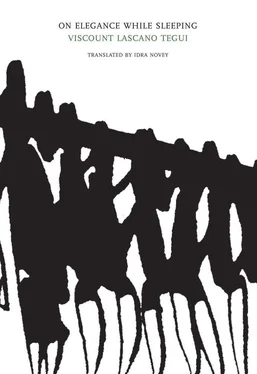OCTOBER 12, 18—
One of my school friends was named Gaston. He was one of those strange kids who, conditioned by their up-bringing, eventually manage to accomplish something that seems quite extraordinary, given their circumstances — but which is really just the silent culmination of all the lessons they’ve naturally come by. There are some books children read before they’ve learned the alphabet; Gaston was already an old man when he was a boy. Or, better, as his childhood was intense and grim, one might compare it to the years between a man’s twenty-nine and thirty-fifth birthdays — the approach of middle age. While other children slept under cotton sheets, sheltered from the weather under their lace and swaddling clothes, Gaston spent those same hours out in the elements, in the snow, in the sun, in the wind and water. His mother sold flowers. Tied up in a makeshift papoose, he hung from his mother’s back as she put together her many bouquets. Hours passed without her thinking about the boy. He was like a stick doll. He cried at first, but his tears didn’t have the least effect on his mother — though they did attract plenty of customers. Gaston stopped when he realized that crying was not to his benefit. He just stared. Pupils dilated. He learned to read on his own. Sometimes, it was the red and yellow wheels of the passing cabs that entertained him. Other times, it was the iron gate of a garden. Most of the time, it was his mother’s multicolored bunch of flowers in her basket, and then, when she set him down on his stomach, the gutter running level with the line of the sidewalk, dogs, the heels of passersby, the tips of umbrellas, the wooden shoes of municipal street sweepers…
It seemed as though he would never grow up, trapped in his diapers, constrained within the perverse sling his mother had devised; at last one of his sisters came to liberate him, afraid he might stay tiny, like some miniature apple tree in a Japanese garden. By then all the sap that had been unable to reach his branches, so to speak, had pooled instead into his eyes: His eyes didn’t just observe, they photographed what they saw. Later, at school, he used to entertain us with these images…
When you’re a child, or a tourist — which is, after all, an infantile mode in which to travel the world — you might on occasion enjoy those tiny novelty kaleidoscopes or telescopes inside of which skillful manufacturers have placed images of the Cologne Cathedral, the Leaning Tower of Pisa, or the Roman Coliseum. We had no need of these in our class, because inside of Gaston’s eyes — if we asked — we could see all the dogs, flower baskets, and carriage wheels of his infancy. It was remarkable. But — oh, the logic of nature! — whenever the girls going home from school would pass by, Gaston’s eyes, against his will, would fill with images of nothing but those roses, jasmines, and violets for which his tears, in times past, had served as such persuasive salesmen.
NOVEMBER 4, 18—
The French have the impression that only people who are a little wrong in the head, suspect types, ever leave their homelands for other countries. But it’s not true. Quite the opposite.
I had a friend from Bordeaux, an elegant woman, strikingly tall. I thought all women from Bordeaux would be like her. When I went there, I found there was no one there to equal her. None of the natives even reminded me of her.
I went into a brothel one afternoon and met a Belgian woman from Ostend. She had such beautiful breasts that I reserved the entire house in their honor. I made them lock the doors and searched through their business records for the voluptuous history of those perfect breasts: from where could they have come? When I traveled then to Ostend — believing all the women there would have breasts of equal beauty — I found with sadness that not even their fourteen-year-olds were possessed of such ideal apparatuses as those I’d discovered in Paris…those I had lost by allowing myself to get caught up with generalizations in a brothel!
The most beautiful woman I believe I’ve ever met was Danish, but having discovered some white hookworms beneath the skin of her rosy legs, I developed a profound disgust for Denmark and its women. Later, quite by accident, I stood before the naked daughter of a Danish architect, not knowing what part of the planet she was from — she was the second most beautiful woman I think I’ve met, and this one didn’t have worms on any of her important features. It’s never a good idea, you see, to generalize.
Other examples. As a student, I went to a brothel in the southern slums of Paris. One of the women I frequented was English. An absolute delight.
What a beautiful little creature!
They called her “The Star of the South.” She was famous throughout the city and even into the countryside. Peasants traveled to see her. But are all English women like her?
No, no one in England was the least bit like her.
And then there was the woman who came out for the last dance at the Tuileries. She seemed to have stepped, at once, out of Balzac and some distant French province. She was a dark-skinned queen. Quite poised. The midday sun had ripened her alongside the fields of oranges. Above all she radiated distinction and nobility — blue blood.
I discovered her later in a brothel in Seville: her native city. She was the daughter of a cigar maker.
From this interminable rosary of vexations, I speculate that the best citizens of every country emigrate because they feel slightly superior to their countrymen, able to be quite outstanding individuals without their national context to support them. Each of these, then, are worth as much in themselves as an entire nation. In fact, they are their own nations: nations without geographic roots. They recline upon the clouds, where Zeus set his throne, those clouds that veiled the feet of immortal Hebe.
NOVEMBER 20, 18—
And so the old coachman climbed up onto the coachbox, where I was already installed. It was time to go. I snapped the whip and we were off, me playing coachman and he acting a little out of sorts, as if fallen on hard times, unhappy at now playing the sad role of passenger.
Crossing a street, I almost hit a skinny old man dressed as a gendarme. Just in time, my friend grabbed the reins from me with all the equanimity of the father confessor he’d once been — back when the hymens of his parishioners were in his personal, pious care. In exchange for the pleasure of the reins, which he didn’t return, he told me the story of my near-victim, now behind us.
“Back when I was a boy,” the coachman said, “that man we just passed by was the forest warden for the Lord of Croissic, though he never really knew how to take advantage of his job. His conscience was always getting in the way — he was too taken with his responsibilities, and then with the memory of a strange incident from his first years on the job. Making his rounds one day, he saw a buck behind some shrubs. He began to move as quietly as he could manage, as though he was a hunter himself and not the supposed protector of his master’s game. He let himself be tempted by a catch so beautiful that even his boss would have to approve of his taking a shot. He saw all the many kilos of meat and the pelt he could use later to clean the copper saucepans in his kitchen. He aimed and fired. He heard a cry. His bullet had hit the buck, which toppled over.
“When he went over to retrieve his kill, imagine his surprise when he saw, instead of a buck, a dead poacher. The man’s chestnut-colored pants had tricked him.
“A tragedy. And he blamed it all on his imagination. The imagination is what ennobles the savage, you know, and turned our Hottentot grandparents into wise men, kings, and priests. In this man, the poetry of his imagination had led him to commit murder. He was always sorry. And his pain was all the greater because he couldn’t now serve as an example to his children of the moral superiority that makes for a happy life. How could he ever be ashamed of their behavior now that he had made himself a criminal?
Читать дальше












